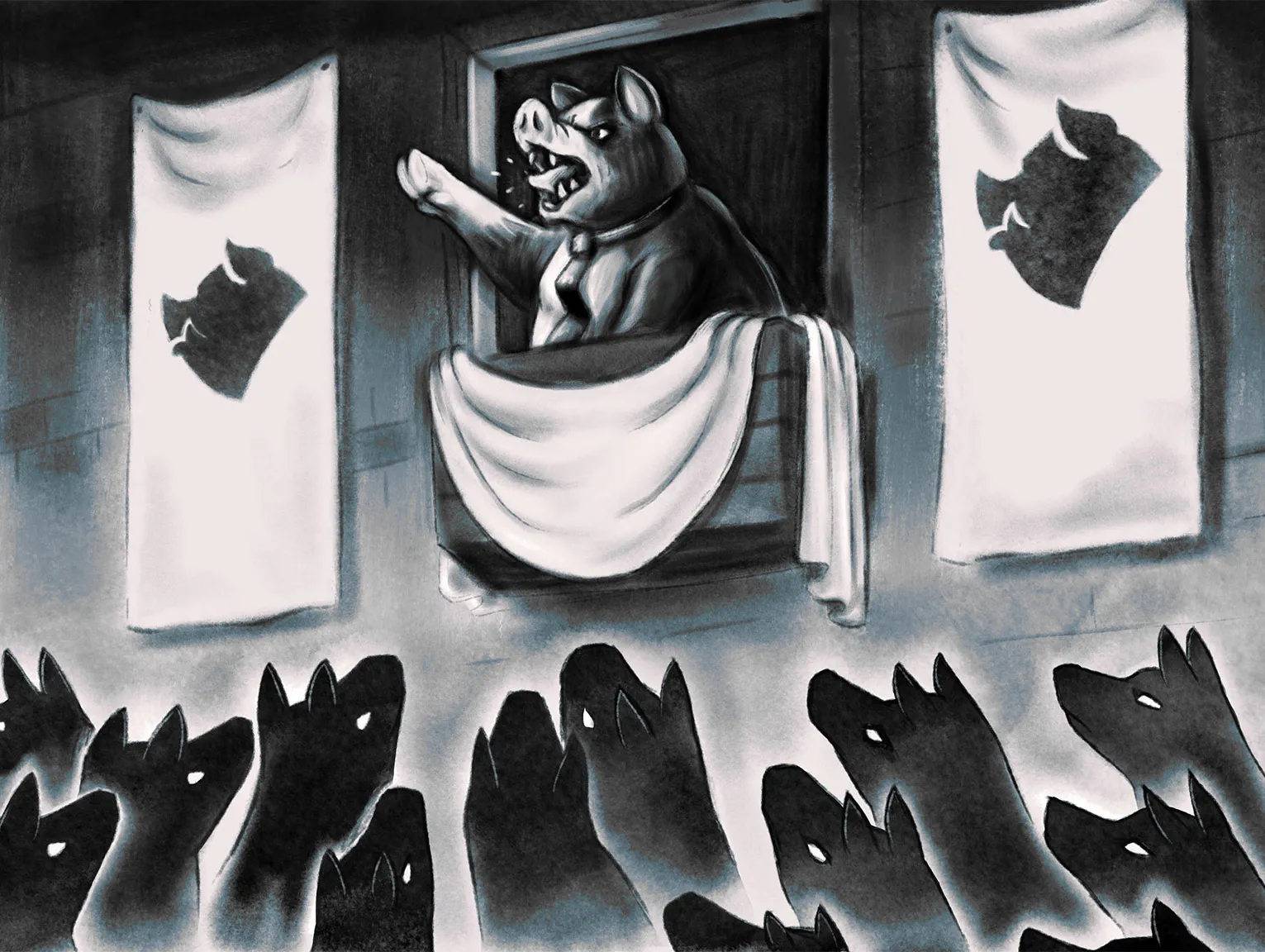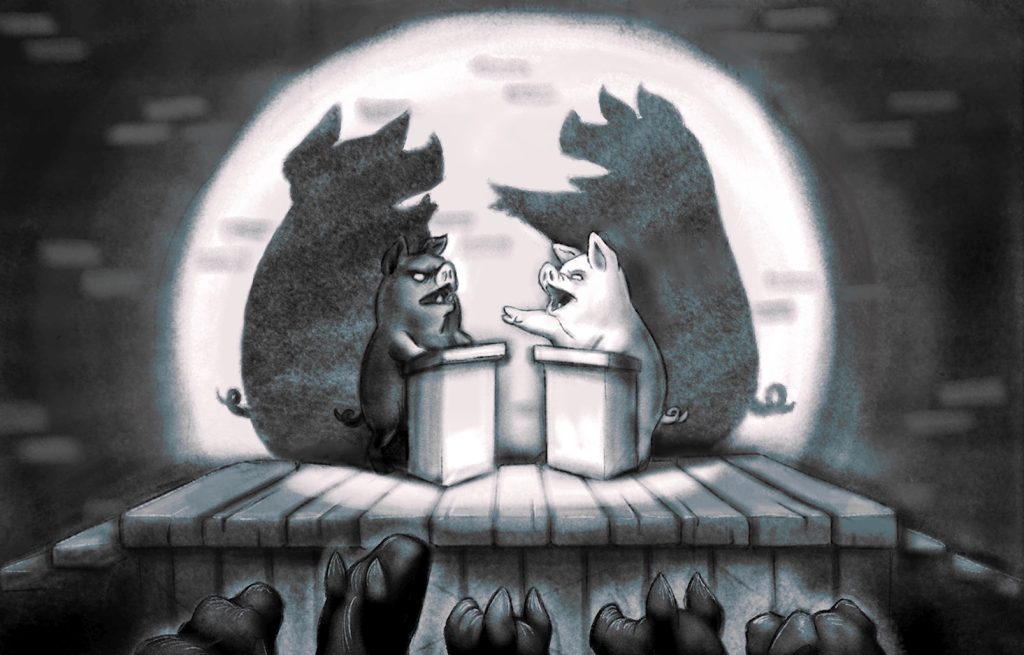Language and the use of eloquence are employed throughout George Orwell’s novel Animal Farm to establish more power. Mr. Jones is banished as a result of Napoleon’s unfair government, which is made possible through the control of words and language employed. The pigs used their eloquent ability and language manipulation to control the farm’s destiny in every circumstance that called into doubt their supremacy. The animals on the farm in this allegory highlight humans’ vulnerability to language manipulation, the false sense of righteousness and selflessness caused by loud words, and the power of persuasive speech without fully understanding the message.

Animal Farm is written in plain, clear, and accessible language by George Orwell. Orwell avoids emotion and keeps description and conversation to a minimum; even the most heartbreaking passages of the text are written in a direct style. He concentrates on narrating the story, which allows the reader to focus on the lessons he wants us to take away. Orwell demonstrates how speech can be a strong instrument of persuasion through the pigs. The different ways of language that Orwell uses are persuasive questions, controlling questions, and repetition. An example would be, ‘Comrades’, he said quietly, ‘do you know who is responsible for this? Do you know the enemy who has come in the night and overthrown our windmill? SNOWBALL!’ pg. 47, there are uses of personal pronouns – Napoleon uses ‘Comrades’ and ‘our’ to get the other animals on his side and uses of questions and repetition – ‘Do you know who is responsible for this?’, ‘do you know the enemy..?’. Napoleon repeats the question and gives them his own answer ‘SNOWBALL’; here, questions are used to control.
Animal Farm investigates the use of propaganda to manipulate people. Orwell depicts the animals being controlled by standard propaganda techniques, such as songs, slogans, and constantly changing information, from the beginning of the novel. Singing “Beasts of England” elicits an emotional response in the animals, reinforcing their devotion to Animalism and the pigs. The use of phrases like Napoleon is always right or four legs good, two legs bad indicates their lack of understanding of the revolution’s sophisticated ideological and cultural ideals. The Seven Commandments of Animalism are always changing, demonstrating how individuals in control of knowledge may manipulate the rest of a population. The pigs, who serve as the leaders of the farm, are the only animals with a strong command of language. Snowball is an eloquent speaker who composes the philosophy of Animalism and persuades his fellow beasts with the power of his oratory. Squealer is adept at lying and spinning stories to maintain control. (For example, when the other animals are upset about Boxer’s cruel fate, Squealer quickly composes a fiction to defuse their anger and confuse the issue.) Napoleon, while not as smart or as eloquent as Snowball, is skilled at imposing his own false view on everyone around him, as when he falsely inserts himself into the historical record of the Battle of the Cowshed.

Language is employed as a tool of social control in a variety of ways. Squealer is a character who utilises language to keep Napoleon in power. In Chapter 6, it states, With some difficulty Muriel spelt it out. It says ‘No animal shall sleep in a bed with sheets’ she announced finally. Curiously enough, Clover had not remembered that the Fourth Commandment mentioned sheets; but as it was there on the wall, it must have done so. Because Squealer and Napoleon can easily change the Seven Commandments without any animals noticing, this quote displays power manipulation. The pigs were responsible for rewriting history. The pigs in the story Animal Farm achieve authority and then use that power to influence the animals. From the start, Snowball and Napoleon had everything planned out. Napoleon was the mastermind behind everything, whereas Snowball was a traitor to the animals. In Chapter 7, Squealer was the one rewriting history because he put Snowball out there as Mr. Jones’ agent. Therefore, if anyone wanted to agree with Snowball was automatically assumed as a traitor and enemy to the animal farm. It’s not what actually is done, it is what others portray them as. Another way history was rewritten in Animal Farm involves the rules of Animalism. No animal shall sleep in a bed. No animal shall drink alcohol. No animal shall kill any other animal. All animals are equal. These rules are changed into No animal shall sleep in a bed ‘with sheets’. No animal shall drink alcohol ‘in excess’. No animal shall kill any other animal ‘unless killing is necessary’. All animals are equal ‘but some are more equal than the others’
The concept of Animal Farm is developed throughout the novel by George Orwell. All animals are equal, but some animals are more equal than others, according to the statement. That quote demonstrates how the story’s central theme is leadership and power corruption. Animal Farm is an allegory and satire about the Russian Revolution and how communism came to be. This prompts us to consider how language manipulation could have been used. Animal Farm shows how individuals’ susceptibility to language manipulation, the false sense of righteousness created by powerful words, and the effect of persuasive speech without fully grasping its meaning can frequently lead to confusion and weakness among the masses. Despite the fact that the characters in the story were animals that may be considered stupid, the novel demonstrates that humans are no better when it comes to manipulating one another via the power of words.